 According to a new poll out today, voters in Minnesota may be getting wise to the state Republicans' scheme to suppress the votes of minorities, the elderly, students and the poor, all of whom have the annoying habit of voting in favor of Democrats.
According to a new poll out today, voters in Minnesota may be getting wise to the state Republicans' scheme to suppress the votes of minorities, the elderly, students and the poor, all of whom have the annoying habit of voting in favor of Democrats.
After MN's Democratic Governor Mark Dayton vetoed a law passed by Republicans in the legislature last year that would have required state-issued Photo ID for voters at the polling place before they were allowed to cast their vote, the Republicans decided to bypass the Governor and take the issue straight to the voters.
Without a single Democratic vote, and opposed by the state's chief election official, Sec. of State Mark Ritchie (D), GOP members of the legislature voted to put the issue up for a Constitutional Amendment referendum on the ballot this November.
While the wording of the ballot question itself was challenged by the League of Women Voters and other voting rights groups who charged that the language chosen for the ballot was purposely deceptive and failed to detail the real effects of the Amendment, at the time we first wrote about the matter in July, our legal analyst Ernie Canning noted that, if the referendum was allowed on the ballot, there was a very real chance that it might be supported by voters who, he said, have been "utterly deceived [in the] court of public opinion" about the need for such a restriction.
Citing a May 2011 poll of Minnesotans by the Star Tribune, Canning noted that a whopping 80%, at the time, supported the adoption of photo ID restrictions in the state.
The bad news is that, despite some skepticism displayed during the recent MN Supreme Court hearing about the ballot question (as well as the legalities of such a Constitutional Amendment itself, which was not at issue during the case heard by the court, whose justices are all appointees of former Republican Gov. Tim Pawlenty), the court eventually decided to allow the initiative to remain on the ballot this November as written.
The good news, on the other hand, is that, following an uptick in mainstream media coverage of the issue over the past several months, while a slim majority in the state still favor the amendment, support appears to be nose-diving, at least among Democrats and independents, according to a new survey by the Star Tribune...
According to the paper's coverage of their Star Tribune Minnesota Poll as published today, support for the measure has "weakened dramatically" since the 2011 survey:
That is a far cry from the 80 percent support for photo ID in a May 2011 Minnesota Poll, when the issue was debated as a change in state law. Support among Democrats has cratered during a year marked by court battles, all-night legislative debates and charges that the GOP is attempting to suppress Democratic votes.
Republicans and independents continue to strongly back the proposal, which passed the Legislature this year without a single DFL [MN's state Democratic Party] vote.
But 52 percent approval is a thin margin for a constitutional amendment six weeks before the election. A change in the Constitution must secure a majority of "yes" votes from all ballots cast. That means a voter who doesn't vote on the issue in effect votes no, setting a higher bar for passage.
"Last year," the paper explains, "Nearly two-thirds of Democrats and 83 percent of independents said yes" in response to the same survey question. But now, things have drastically changed.
"Only 22 percent of the likely Democratic voters support it in the Minnesota Poll. Independents, who favored photo ID by 83 percent in 2011, now support it by 61 percent," according to latest poll results. At the same time, the Star Tribune notes, "Republican support remains strong at 87 percent."
At the time The BRAD BLOG first covered questions about the MN GOP initiative, Canning noted:
Canning went on to lament:
But, alas, the vast majority of U.S. citizens have neither watched the C-SPAN video of the September 2011 hearings nor read any of nearly ten years of articles at The BRAD BLOG. The vast majority are bombarded daily, on the other hand, by an all-pervasive right-wing media that entails not only Fox "News" and right-wing radio, but multiple right-wing newspapers and think tanks --- all of whom have no problem at all repeating the lies in service of what they see as the greater good: holding or obtaining political power.
Well, the good news, at least as of late September 2012, is that many more Minnesotans --- at least those Democrats and independents who don't rely on the deceptions of Fox "News" and Rightwing talk radio for their "news" --- are finally catching on to the Republican ruse.
With support for Democratic candidates growing in the state (TPM's Poll Tracker average currently shows President Barack Obama with a nearly 8 point leader over Gov. Mitt Romney, and Sen. Amy Klobuchar with a whopping 20 point lead over her Republican rival Kurt Bills), the state GOP's latest attempt to restrict voting in the Land of 10,000 Lakes may end up failing after all at the polls this November.
Elsewhere today, in related news, closing arguments are being heard before a 3-judge panel in D.C. federal district court in South Carolina's Photo ID restriction case. Last December, the U.S. Dept. of Justice refused to give preclearance to the GOP law after finding that, according to the state's own statistics, "minority registered voters were nearly 20% more likely to lack DMV-issued ID than white registered voters, and thus to be effectively disenfranchised by [the law's] new requirements."
The same data showed that "there are 81,938 minority citizens who are already registered to vote and who lack DMV-issued identification."
SC already had one of the most strict polling place ID requirements in the nation, even before passing the more draconian restriction last year. Prior to passage of the new law, voters were required to show either a state-issued drivers license, a state-issued Photo ID, or a voter registration card sent to them by the county before casting their vote at the polls. The new law, essentially, does away with only the last of those three options, despite the fact that, as the DoJ pointed out in their rejection of the law as a violation of the federal Voting Rights Act [PDF], the state failed to offer "any evidence or instance of either in-person voter impersonation or any other type of fraud that is not already addressed by the state's existing voter identification requirement and that arguably could be deterred by requiring voters to present only photo identification at the polls."
The state, thanks to its long history of racial discrimination at the polls, is one of several "covered" jurisdictions under Section 5 of the Voting Rights Act requiring "preclearance" for new election-related laws. Having failed to receive that preclearance from the DoJ late last year, the state is now exercising their option to have another bite at the same apple by appealing the matter to the 3-judge federal panel today.
And tomorrow, in a Commonwealth Court in Pennsylvania, a new hearing will be held over the state Constitutionality of their new polling place Photo ID law, also passed by Republicans. An August ruling by the same Commonwealth Court judge shocked plaintiffs by approving the new law by declining to issue the temporary injunction sought by voting rights advocates in the state.
But last week, all 6 sitting members of the PA Supreme Court (3 Republicans and 3 Democrats) ruled to vacate the lower court's finding and ordered a new hearing in which the state must prove they are legally able to issue "free" Photo IDs to all eligible voters who require them, and that no voters will be disenfranchised in the bargain. If Commonwealth Court Judge Robert Simpson is unable to "predict" that will be the case under the new law, he has been ordered by the Supremes to issue a temporary injunction by October 2nd.
In the Pennsylvania case, the state stipulated before the trial even began that --- even though the law was said needed by lawmakers to combat "voter fraud" --- they were unaware of a single instance of polling place impersonation (the only type of voter fraud that can possibly be deterred by polling place Photo ID restrictions) in the history of the state.
Indeed, as a nationwide survey of all known cases of election fraud in all 50 states since 2000 recently revealed, there are just 10 known cases of polling place impersonation out of hundreds of millions of votes cast across the country during the same period.
In short, polling place Photo ID restrictions are not meant to combat "voter fraud", they are meant to combat voters, specifically, Democratic-leaning voters, and their ability to cast their lawful vote in this November's Presidential election and beyond.


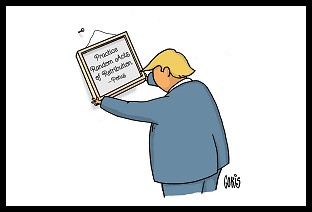 Sunday 'Random Acts of' Toons
Sunday 'Random Acts of' Toons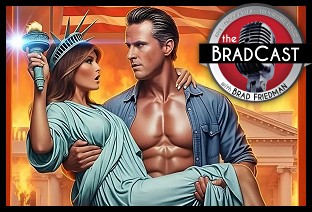 From CA's 'Nuclear Deterrence' Map to Newsom's Trolling to Trump's 'Fascist Theatre' and Beyond: 'BradCast' 8/21/25
From CA's 'Nuclear Deterrence' Map to Newsom's Trolling to Trump's 'Fascist Theatre' and Beyond: 'BradCast' 8/21/25 'Green News Report' 8/21/25
'Green News Report' 8/21/25
 On 'Americanism' and Trump's 'Stalinesque' Plot to Whitewash U.S. History: 'BradCast' 8/20/25
On 'Americanism' and Trump's 'Stalinesque' Plot to Whitewash U.S. History: 'BradCast' 8/20/25 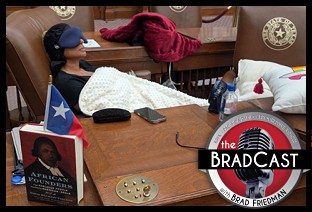 Texas GOP Imprisons Dem State Lawmaker in State House Chamber: 'BradCast' 8/19/25
Texas GOP Imprisons Dem State Lawmaker in State House Chamber: 'BradCast' 8/19/25 'Green News Report' 8/19/25
'Green News Report' 8/19/25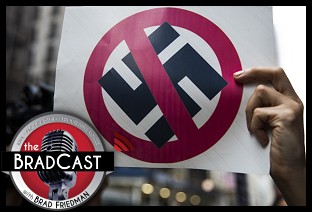 Trump, Nazis and
Trump, Nazis and 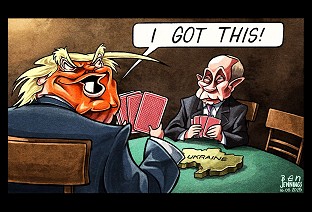 Sunday '
Sunday '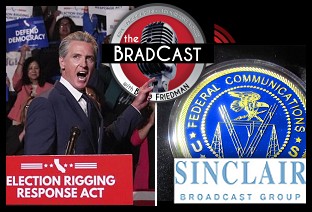 Newsom's 'Election Rigging Response Act'; FCC's License Renewal for Sock-Puppeting Sinclair: 'BradCast' 8/14/25
Newsom's 'Election Rigging Response Act'; FCC's License Renewal for Sock-Puppeting Sinclair: 'BradCast' 8/14/25 'Green News Report' 8/14/25
'Green News Report' 8/14/25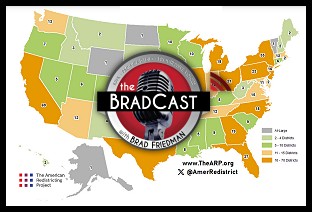 140 New House Reps?: Moving Beyond the Gerrymandering Wars: 'BradCast' 8/13/25
140 New House Reps?: Moving Beyond the Gerrymandering Wars: 'BradCast' 8/13/25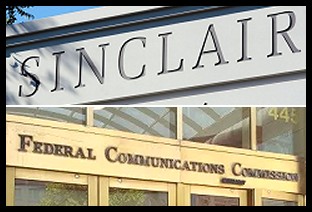 FCC Renews Sinclair TV Licenses Despite Complaint from Petitioner Who Died Waiting
FCC Renews Sinclair TV Licenses Despite Complaint from Petitioner Who Died Waiting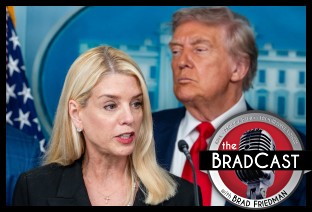 It's Not About the Rule of Law, It's About Authoritarian Control: 'BradCast' 8/12/25
It's Not About the Rule of Law, It's About Authoritarian Control: 'BradCast' 8/12/25 'Green News Report' 8/12/25
'Green News Report' 8/12/25 After Vaccine Cancels, CDC Shooting, Former Officials Want RFK Out: 'BradCast' 8/11/25
After Vaccine Cancels, CDC Shooting, Former Officials Want RFK Out: 'BradCast' 8/11/25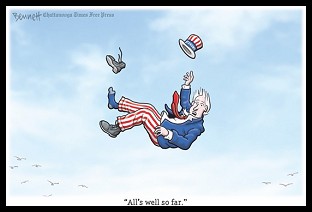 Sunday 'All's Well' Toons
Sunday 'All's Well' Toons 'Green News Report' 8/7/25
'Green News Report' 8/7/25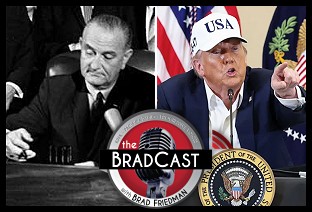 Trump Wars Against Greem Energy, Democracy on VRA's 60th: 'BradCast' 8/7
Trump Wars Against Greem Energy, Democracy on VRA's 60th: 'BradCast' 8/7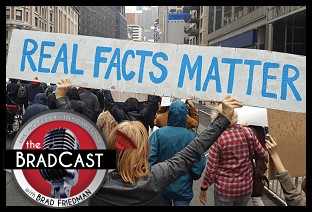 Media Conglomerates Continue Trump Capitulation: 'BradCast' 8/6/25
Media Conglomerates Continue Trump Capitulation: 'BradCast' 8/6/25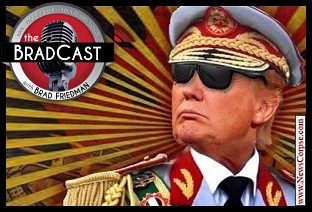 Banana Republican: Trump Shoots the Labor Statistics Messenger: 'BradCast' 8/5/25
Banana Republican: Trump Shoots the Labor Statistics Messenger: 'BradCast' 8/5/25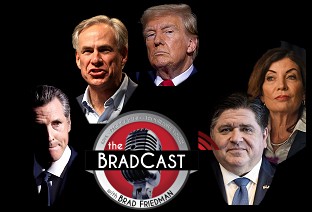 All's Fair in Love, War and, Apparently, Part-isan Gerrymandering: 'BradCast' 8/4/25
All's Fair in Love, War and, Apparently, Part-isan Gerrymandering: 'BradCast' 8/4/25 The Art of the Corrupt, Phony, Unlawful, Pretend Trade Deal: 'BradCast' 7/31/25
The Art of the Corrupt, Phony, Unlawful, Pretend Trade Deal: 'BradCast' 7/31/25 Battle Begins Against Trump EPA Climate Regulations 'Kill Shot': 'BradCast' 7/30/25
Battle Begins Against Trump EPA Climate Regulations 'Kill Shot': 'BradCast' 7/30/25 A Pu Pu Platter of Trump Corruption: 'BradCast' 7/29/25
A Pu Pu Platter of Trump Corruption: 'BradCast' 7/29/25 'Catastrophic' GOP Cuts to Medicaid, Medicare, ACA: 'BradCast' 7/28/25
'Catastrophic' GOP Cuts to Medicaid, Medicare, ACA: 'BradCast' 7/28/25
 VA GOP VOTER REG FRAUDSTER OFF HOOK
VA GOP VOTER REG FRAUDSTER OFF HOOK Criminal GOP Voter Registration Fraud Probe Expanding in VA
Criminal GOP Voter Registration Fraud Probe Expanding in VA DOJ PROBE SOUGHT AFTER VA ARREST
DOJ PROBE SOUGHT AFTER VA ARREST Arrest in VA: GOP Voter Reg Scandal Widens
Arrest in VA: GOP Voter Reg Scandal Widens ALL TOGETHER: ROVE, SPROUL, KOCHS, RNC
ALL TOGETHER: ROVE, SPROUL, KOCHS, RNC LATimes: RNC's 'Fired' Sproul Working for Repubs in 'as Many as 30 States'
LATimes: RNC's 'Fired' Sproul Working for Repubs in 'as Many as 30 States' 'Fired' Sproul Group 'Cloned', Still Working for Republicans in At Least 10 States
'Fired' Sproul Group 'Cloned', Still Working for Republicans in At Least 10 States FINALLY: FOX ON GOP REG FRAUD SCANDAL
FINALLY: FOX ON GOP REG FRAUD SCANDAL COLORADO FOLLOWS FLORIDA WITH GOP CRIMINAL INVESTIGATION
COLORADO FOLLOWS FLORIDA WITH GOP CRIMINAL INVESTIGATION CRIMINAL PROBE LAUNCHED INTO GOP VOTER REGISTRATION FRAUD SCANDAL IN FL
CRIMINAL PROBE LAUNCHED INTO GOP VOTER REGISTRATION FRAUD SCANDAL IN FL Brad Breaks PA Photo ID & GOP Registration Fraud Scandal News on Hartmann TV
Brad Breaks PA Photo ID & GOP Registration Fraud Scandal News on Hartmann TV  CAUGHT ON TAPE: COORDINATED NATIONWIDE GOP VOTER REG SCAM
CAUGHT ON TAPE: COORDINATED NATIONWIDE GOP VOTER REG SCAM CRIMINAL ELECTION FRAUD COMPLAINT FILED AGAINST GOP 'FRAUD' FIRM
CRIMINAL ELECTION FRAUD COMPLAINT FILED AGAINST GOP 'FRAUD' FIRM RICK SCOTT GETS ROLLED IN GOP REGISTRATION FRAUD SCANDAL
RICK SCOTT GETS ROLLED IN GOP REGISTRATION FRAUD SCANDAL VIDEO: Brad Breaks GOP Reg Fraud Scandal on Hartmann TV
VIDEO: Brad Breaks GOP Reg Fraud Scandal on Hartmann TV RNC FIRES NATIONAL VOTER REGISTRATION FIRM FOR FRAUD
RNC FIRES NATIONAL VOTER REGISTRATION FIRM FOR FRAUD EXCLUSIVE: Intvw w/ FL Official Who First Discovered GOP Reg Fraud
EXCLUSIVE: Intvw w/ FL Official Who First Discovered GOP Reg Fraud GOP REGISTRATION FRAUD FOUND IN FL
GOP REGISTRATION FRAUD FOUND IN FL

































